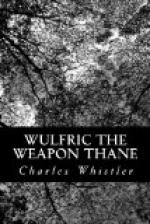Now Eadmund made no more delay, but all that night went forth the summons of the war arrow, and the men mustered in force at last in Thetford town, and I spurred back to Hoxne and found the thane, and spoke to him.
“Let the wedding go on,” I said, “for the Danes are yet far, and must pass the earl and us also before they come hither. Now must I be with the king, but if I may, and Ulfkytel holds them back, I shall be at the wedding. And if it must be, I will warn you to fly, and so let Egfrid take his bride and my mother and his own folk southward to Colchester or London.”
That, he thought, was well, and no word of fear or haste hindered the wedding gathering. Only some of the great thanes who should have been there were with the king or earl, and it seemed that the number of guests would be small.
I rode to Thetford, bidding Eadgyth look for me on the morrow in good time, and saying that the king would surely come also. But when I came to the town I knew that neither he nor I should be at Hoxne, for the Danes had scattered the levy, and Ulfkytel the great earl was slain, and with him many another friend of mine. And the men said that the Danes were marching swiftly onward, ever nearing Thetford, and burning and wasting all in their track.
We marched out of the town to meet them, for we had a good force behind us, and the men were confident of victory with the king himself to lead them. And he was cheerful also, and said to me, as I armed him:
“I would not have you leave the wedding; howbeit, if we beat back the Danes, which is a matter in the hands of the Lord of Hosts, both you and I will be there in time tomorrow.”
Our mounted men met the Danes that evening—the night before Eadgyth’s wedding day—and we slept in our armour on Thetford heath waiting for them. And in the early morning our outposts were driven back on us, and the Danes were close on their heels.
Now Eadmund told me that I should not stand by him today, for so soon as the battle was over I must go to Hoxne, either with news of victory, or to bid them fly, and he would not keep me.
“I will not leave the place that is mine by right,” I said.
“Not so,” he answered; “I would bid you stand out of the battle for sweet Eadgyth’s sake, but that I know you would not obey me.”
And he smiled at me as he went on the great white horse he always rode, to draw up the men.
They cheered when he spoke to them, and I thought that they would fight well. Aye, and so they did, in their fierce untrained way. Many a long day it was since we of East Anglia stood in battle array, and the last time was against our own kin, save that now and again the men of some shoreward places would rise to beat off a Danish or Norse ship.
Now were the foes in sight, and they ranged up in close order when they saw we were ready. More than half their force was mounted, for the Lindsey uplands and marshes had given them horses enough of the best in England. And this was terrible, that over the host wheeled erne and raven and kite, as knowing to what feast the flapping of yon Raven banner called them.




